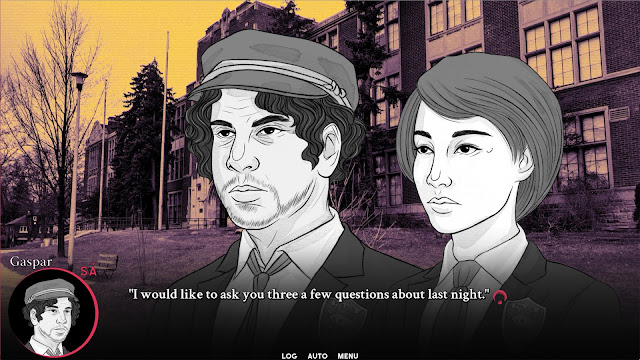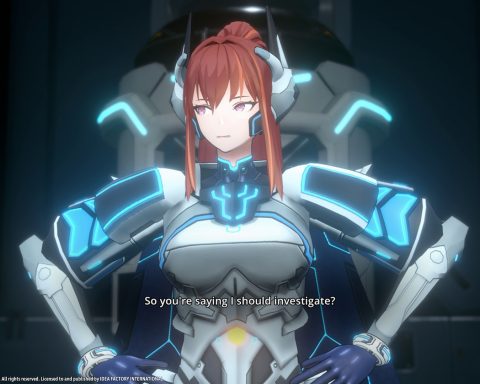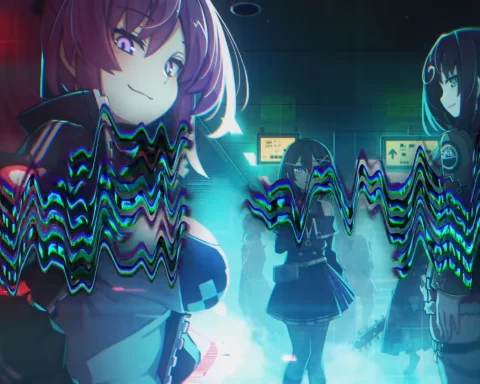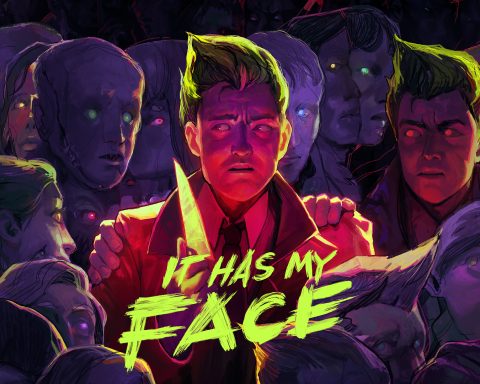Before we get into talking about the game’s many (many) merits, I want to start by saying that Cross The Moon is so incredibly inspiring to me. It’s a visual novel made on a hyper-indie budget and, as a person making my own VNs on hyper-indie budgets, it’s hugely inspiring to see how this developer has taken every budgetary and production limitation and rolled with it in such a way that the end result is powerfully different, evocative, and hides its budgetary limitations beautifully. It has already been quite the year for the Nintendo Switch and visual novels that really drive home the artistic value of the genre. The House In Fata Morgana, Doki Doki Literature Club, and Gnosia all highlight just how valuable the VN format is to storytelling. Cross The Moon is destined to be a hidden gem in comparison to those two, but a hidden gem it is indeed.
The most immediately noticeable thing about Cross The Moon is its aesthetic. The game eschews the standard approach to visual novels (i.e. artist-drawn backgrounds) to instead present players with real-world photographs that have been heavily distorted through the use of colour saturation to give them a surrealistic quality. The genius here is that you’ve never, ever played a game that quite looks like this, and the surrealistic edge has then allowed the developer to take a fairly standard noirish story, insert vampires (that can move about in the day) and cosmic horror, real-world themes like class warfare and racism, and a story-within-a-story structure and somehow make it all work together. Cross The Moon shouldn’t be as cohesive as it is, and it does seem esoteric in screenshots and on the first impression, but once you give yourself an hour or so to immerse yourself into it, you realise that it’s all kinda brilliant. It’s true auteur theory stuff, to the extent that the approach here can only work in video games when the developer is a one-person studio (because the moment you introduce additional team members in game development there is the expectation that the creativity becomes a group project).
I don’t reference auteur theory at random here, either, because that theory largely comes from French New Wave cinema and the work of people like Jean-Luc Goddard, and Cross The Moon has a very strong New Wave vibe to it, both in terms of aesthetics and narrative. French New Wave emerged as an impoverished post-war France became highly experimental in its films and very much rejected the norms that Hollywood was establishing in America. As noted on Masterclass: “The French New Wave began with a group of film critics and cinephiles who wrote for Cahiers du cinéma, a famous French film magazine owned by André Bazin. These critics—including Jean-Luc Godard, François Truffaut, and Éric Rohmer—pushed against big film studios controlling the creative process, and wanted full control of their films.”

While we don’t have any big game studios “controlling the creative process” with regards to visual novels, there are certainly norms in the genre, and furthermore, there are norms with regards to broader video games, with significant pressure by the community (rather than the studios) to make games conform to those norms. Cross The Moon almost represents a double-rejection of norms here, with visual novels themselves being criticised for not being enough like games to even deserve to be called games (and Cross The Moon has absolutely no game-like elements in it, as a kinetic VN). Meanwhile, visual novel fans have their own set of demands on VNs, are do tend to take a dim view of western artists that subvert their expectations of what goes into a VN. Cross The Moon isn’t anything like any VN (and therefore game) you may have played before, and it’s confidently proud of that. So the New Wave spirit is very much alive in Cross The Moon, across both aesthetic and its design.
However, for me, the most interesting comparison point between Cross The Moon and New Wave is the way that it tells its story, however. Again to quote Masterclass: “While Old Hollywood films aimed to entertain, most French New Wave films were about expressing the directors’ thoughts or emotions, dealing with difficult, intellectual topics like existentialism and the absurdity of existence. They wanted to encourage their audiences to think both during and after viewing, so the films often featured long takes that allowed audiences’ minds to wander and bring their own experiences to the film.”
Just about all of this applies to Cross The Moon. Where most vampire stories in video games reduce vampires to horrible blood-sucking antagonists or anti-heroes, Cross The Moon instead uses vampires as an analogy to racism, with vampires being forced into enclosed communities, monitored as “dangerous aliens,” to polite society, given serial numbers and terrorised by an arm of the police force specifically set up to deal with the “problem.” The way that the narrative then positions the vampire’s efforts to live in such societies – how it moulds their aspirations, how it affects their relationships with non-vampires, and what it does to the family unit – occasionally dips to a point that it’s too heavy-handed for its own good, but for the most part is a nuanced, interesting, and ultimately… human… treatment of a topic that is incredibly difficult to represent in media in a way that captures the full scope of the discourse. Cross The Moon certainly asks players to think and reflect, both as they play and then afterwards.
The game also encourages players to be in a constant state of contemplation. It does this through the strength of its themes, but also bakes a lot into the structure, with the way it handles shifts between perspectives, presents a story-within-a-story framework, and uses the mystery elements of the noir genre to keep players guessing as to what’s coming up. Now, I realise that much of what I’ve said above would make the game seem very dry and too academic for its own good. Indeed, as much as I admire Jean-Luc Goddard for his cinema theory and subversions, and as much as I find French New Wave to be valuable and important in cinema history and the cinema art movement, I personally much of that body of work deathly boring to actually watch. Cross The Moon avoids this thanks to the surrealist aesthetic (particularly potent after some beers), as well as the lengthy, gripping, and quite eye-opening mysteries that the game presents, along with the standard dive into the grey morality and corrupted society that forms the core of those stories. It also introduces Lovecraftian cosmic horror notes early on (a spiral tattoo only ever means one thing), and from that moment you’re almost begging the game to get on and explain what actually going on with that angle, but it holds those cards close to its chest for the longest time.
Finally, it is interesting just how lingering the game is, without ever feeling like it’s moving at a crawl. The core script is something like 100,000 words in length – which is mid-length for visual novels – but it’s perfectly comfortable with taking its time to reflect on the characters and their thoughts and feelings. At the same time, not a word is wasted, there are no unnecessary digressions, and every character (of a large cast) is there for a reason. It’s some of the tightest writing that I’ve seen in a visual novel to date – too much of this genre mistakes the inane for being characterisation, but this one gets it.
The biggest problem Cross The Moon will face is getting people to pick it up. “A game aligned with French New Wave values and auteur theory with a surrealistic noir narrative and art photography aesthetics” is hardly a bullet point that a PR or marketing agent would want to try selling. I actually was given a copy on PC back when it released last year and put it aside because it was just too esoteric to immediately grab my attention. It’s just too easy to find something “safer” to play than something that looks like it could very easily turn out to be trite. I’m glad that, on a whim, I purchased and gave it a go on Nintendo Switch, because once you give it a go, it rewards the risk you took on playing it. Cross The Moon has a lot going on and all of it is quite brilliant.









